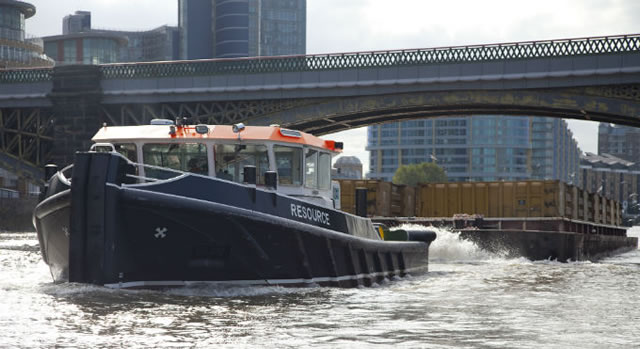Thames Barge Fleet To Keep 100,000 Juggernauts Off Roads
By transporting non-recyclable waste down the Thames for reprocessing

Barge removes waste that cannot be recycled from Smugglers Way
A new fleet of barges is to transport non-recyclable local household waste which along the River Thames, saving London’s roads from tens of thousands of heavy goods vehicle journeys a year.
Cory, the company that deals with all the waste produced by households in the four boroughs of Wandsworth, Lambeth, Hammersmith & Fulham and Kensington & Chelsea, has announced it is to invest £7m in a new fleet of river barges so it can continue to transport waste along the Thames for reprocessing.
According to Cory their new barges will have a more efficient design compared to those currently used and will have improved safety features. Each barge will be able to carry 250 tonnes of waste – each one saving London’s streets from the equivalent of 70 juggernaut journeys. Overall Cory transports around 600,000 tonnes of refuse a year on the Thames, saving more than 100,000 heavy vehicle movements a year on the capital’s already congested roads.
The news has been welcomed by the council’s transport spokesman Cllr Paul Ellis who said: “This is great news for air quality in the capital. This investment by Cory will mean Londoners continue to benefit from 100,000 fewer juggernauts on the capital’s roads. And using the much-underused transport artery that is the Thames will not only help improve air quality, it will mean less traffic congestion and make London’s streets that little bit safer for other road users and pedestrians.”
The four boroughs are members of the Western Riverside Waste Authority (WRWA) which has two sites in the borough – at Smugglers Way near Wandsworth Bridge and also Cringle Dock close to Battersea Power Station.
All the waste and recycling collected in the four boroughs is brought to these two sites and while the recycling is automatically separated and processed at Smugglers Way, the non-recyclable waste is loaded onto barges and transported 20 miles downstream to an energy from waste plant in Erith which recycles the waste into electricity that powers 100,000 homes.
The residue from this process is recycled into aggregate used by the construction industry to build homes and roads. Including this material in Wandsworth’s recycling figures would see the borough’s recycling rate rise to around 42 per cent.
This method of processing non-recyclable waste also means that none of the waste produced in Wandsworth and the three other boroughs is sent to landfill – an historic method of disposal which caused great environmental damage and generated significant greenhouse gas emissions.
Commenting on the investment, Cory’s chief operating officer Julian Walker, said: “Cory has a long and proud history of operating on the Thames and this investment demonstrates our commitment to the capital’s ‘green highway’. The investment will allow us to maintain and expand our river-based operations and continue making the most of the River Thames in years to come.”
June 11, 2019
Related links
|